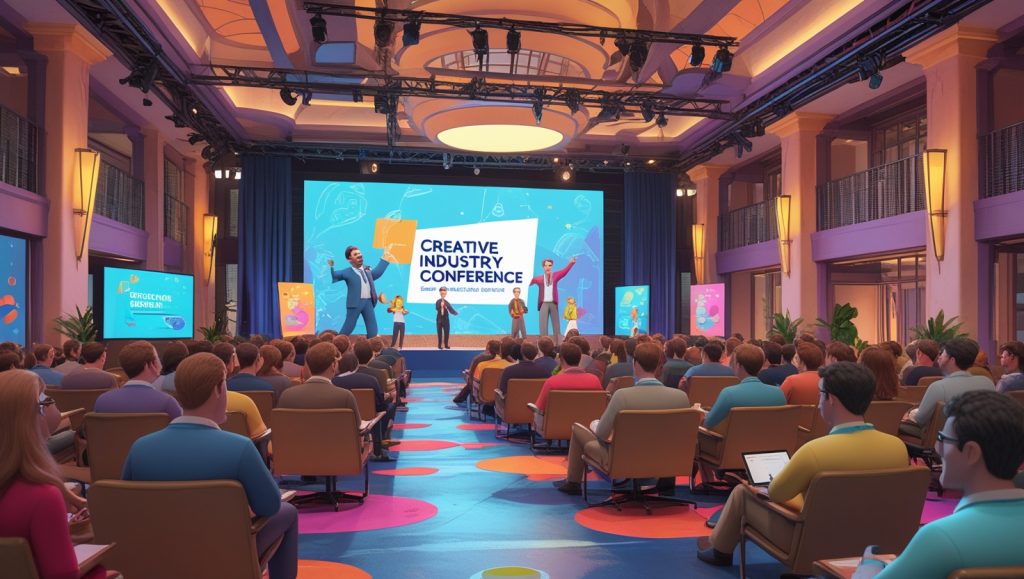Conference marketing has become one of the most powerful tools for organizations looking to build authority, attract leads, and create meaningful professional connections. As global event attendance continues to rise—projected to reach $2.1 trillion in spending by 2032—marketers, organizers, and industry leaders are now prioritizing smarter, more strategic approaches to promoting conferences.
Whether you’re planning a large professional summit, an academic gathering, or a niche industry event, your marketing strategy determines how many people register, engage, and convert. In this guide, we break down conference marketing from A to Z, uncovering proven tactics, modern trends, and actionable steps to help you stand out in an increasingly competitive landscape.
What Is Conference Marketing?
Conference marketing refers to the strategic promotion, branding, and communication activities used to generate awareness, drive attendance, and enhance engagement before, during, and after a conference. It blends event management, digital marketing, PR, and audience psychology to create high-impact experiences.
Effective conference marketing ensures:
- Higher ticket sales
- Stronger sponsorship participation
- Increased visibility for speakers and organizers
- Long-term institutional credibility
- Measurable ROI via leads, signups, and partnerships
In an age where information moves fast and competition is fierce, conferences must go beyond traditional posters and emails—successful events rely on data-driven digital strategies, immersive storytelling, and personalized engagement.
The Importance of Conference Marketing in Modern Events
Marketing is no longer a supporting function for events—it is the backbone that shapes audience experience and event success.
1. Drives Attendance and Visibility
In a crowded digital ecosystem, potential attendees need a compelling reason to attend. The right combination of social proof, targeted ads, and content-driven campaigns boosts registrations.
2. Strengthens Your Event Brand
Branding influences how your event is perceived. Strong conference marketing builds recognition, loyalty, and trust, making future events easier to promote.
3. Helps Attract High-Value Sponsors
Sponsors invest where they see visibility. Effective marketing materials, clear audience profiles, and strong engagement metrics directly increase sponsorship appeal.
4. Enhances Attendee Engagement
Engagement starts long before the conference begins—through email sequences, speaker announcements, social media teasers, and interactive content.
5. Generates Long-Term ROI
A well-marketed conference creates recurring attendance, future membership, and long-term business relationships.
Top Conference Marketing Strategies That Actually Work
Below are the most impactful strategies used in 2025 by leading organizations, academic institutions, and major event organizers.
1. Build a Strong Event Brand Identity
Your conference brand should answer one essential question:
“Why should people attend this conference and not another?”
Elements of an effective conference brand:
- A memorable event name
- A clear value proposition
- Consistent visuals (logo, colors, typography)
- Professional landing pages
- Strong messaging & tone
Brand identity must be applied across all touchpoints, including email campaigns, digital ads, brochures, and stage designs.
2. Create a High-Converting Conference Website
Your website is the heart of your conference marketing strategy.
Key features to include:
- Clear registration CTA buttons
- Speaker profiles with photos & bios
- Agenda or schedule overview
- Social proof (past attendees, testimonials, media mentions)
- Pricing tiers & discounts
- Mobile-friendly design
- SEO-optimized pages targeting conference keywords
Tip:
Use schema markup (Event Schema) to enhance Google visibility and improve the chances of appearing in AI Overviews and the Knowledge Panel.
3. Use Email Marketing to Nurture and Convert
Email remains one of the highest-converting channels for conference promotion.
Essential email types:
- Early bird announcements
- Speaker reveal campaigns
- Countdown sequences
- Personalized reminders
- Post-event follow-ups
Personalization increases attendance by up to 26%, making segmented email campaigns crucial.
4. Leverage Social Media for Awareness & Engagement
Platforms like LinkedIn, X (Twitter), and YouTube are powerful for conference marketing.
High-impact social tactics:
- Share behind-the-scenes content
- Publish speaker interviews
- Post agenda highlights
- Use branded hashtags
- Run targeted ads
- Create short-form video teasers
User-generated content (UGC) further expands your reach as attendees tag your event.
5. Collaborate With Speakers, Influencers & Partners
Your speakers are your strongest marketers.
Ways to maximize speaker influence:
- Provide promotional toolkits
- Encourage them to post videos
- Share thought-leadership articles
- Feature them on your website & social media
Additionally, partner organizations amplify visibility through co-branded promotions.
6. Implement SEO & Content Marketing
Search-optimized content helps attendees discover your conference organically.
SEO tactics include:
- Creating pillar pages on event topics
- Publishing blog posts
- Optimizing speaker bios
- Adding keywords like “conference marketing,” “event promotion,” “industry summit,” etc.
- Building backlinks through partnerships
This improves long-term discoverability and positions your event as an authority.
7. Utilize Paid Advertising
Paid ads accelerate visibility, especially for large-scale events.
Effective ad platforms:
- Google Search Ads
- Meta Ads
- LinkedIn Ads (best for B2B conferences)
- YouTube ads
- Display retargeting campaigns
Ensure ads highlight:
- Main benefits
- Early bird pricing
- Keynote speakers
- Unique experiences
8. Offer Early Bird Discounts & Tiered Pricing
Tiered pricing boosts conversions by creating urgency.
Popular pricing structures include:
- Super Early Bird
- Early Bird
- Standard
- Last-Minute
Why it works:
Scarcity and urgency are powerful psychological triggers that increase registration rates dramatically.
9. Enhance the On-Site Experience with Engagement Tools
Conference marketing doesn’t stop once attendees arrive.
Interactive tools to use:
- QR code agenda access
- Live polls
- Mobile event apps
- AI-powered matchmaking for networking
- Interactive booths
Engagement creates memorable experiences, increasing the likelihood of repeat attendance.
10. Post-Conference Marketing: Don’t Stop After the Event
Your post-event strategy builds loyalty and future attendance.
Key tactics:
- Send thank-you emails
- Publish video highlights
- Share recorded sessions
- Create recap blogs
- Send satisfaction surveys
- Promote next year’s event early
Consistent follow-up keeps your audience connected year-round.
The Role of Technology in Modern Conference Marketing
Technology has completely reshaped how events are marketed and experienced.
AI Tools
AI helps automate email sequences, personalize content, forecast attendance, and analyze performance.
Data Analytics
Track user behavior, session popularity, and traffic sources to optimize future events.
Event Management Platforms
Tools like Cvent and Eventbrite streamline ticketing, scheduling, and communication.
Virtual & Hybrid Capabilities
Even in 2025, hybrid and virtual options expand your audience reach globally.
How to Promote Conferences Across Different Channels
Below is a breakdown of promotion strategies across various marketing channels.
Digital Channels
- SEO & content marketing
- Paid ads
- Social media outreach
- Email automation
- Event listing platforms (including conferencesdaily.com)
Offline Channels
- Print brochures
- Posters at universities & institutions
- Radio & PR outreach
- Networking events
- Partnerships with associations
Word-of-Mouth Marketing
Still one of the most effective strategies.
Encourage:
- Alumni attendees
- Speakers
- Past sponsors
- Media partners
To actively promote the event.
Frequently Asked Questions (FAQ)
Below are PAA-optimized questions tailored for SERP visibility.
1. What is conference marketing?
Conference marketing is the strategy of promoting, branding, and communicating an event to increase registrations, visibility, engagement, and ROI.
2. Why is conference marketing important?
It drives attendance, boosts credibility, attracts sponsors, and ensures long-term event success.
3. How do you successfully market a conference?
Use SEO, social media, email campaigns, paid ads, influencer partnerships, early bird pricing, and post-event engagement.
4. What channels are best for conference promotion?
The most effective are LinkedIn, email marketing, Google Ads, blog content, and event listing portals.
5. When should conference marketing begin?
Ideally 6–12 months before the event for best results, especially for large or academic conferences.
6. How do you attract more attendees to a conference?
Highlight speakers, share valuable content, offer discounts, run ads, and engage audiences on social media.
7. What metrics measure conference marketing success?
Registration numbers, engagement rates, website traffic, email open rates, and sponsor acquisition.
Conclusion: Elevate Your Event with Strategic Conference Marketing
Conference marketing is no longer optional—it is essential for creating high-value, memorable events that attract professionals, researchers, academics, and global participants. With the right strategy, tools, and content-driven approach, your conference can stand out, generate higher attendance, and build lasting impact in your industry.
If you’re ready to promote your conference, connect with more attendees, and gain maximum visibility, start today by listing or promoting your event at:
👉 https://conferencesdaily.com/login.php
Your next successful conference begins with a strong marketing strategy—make it count.















